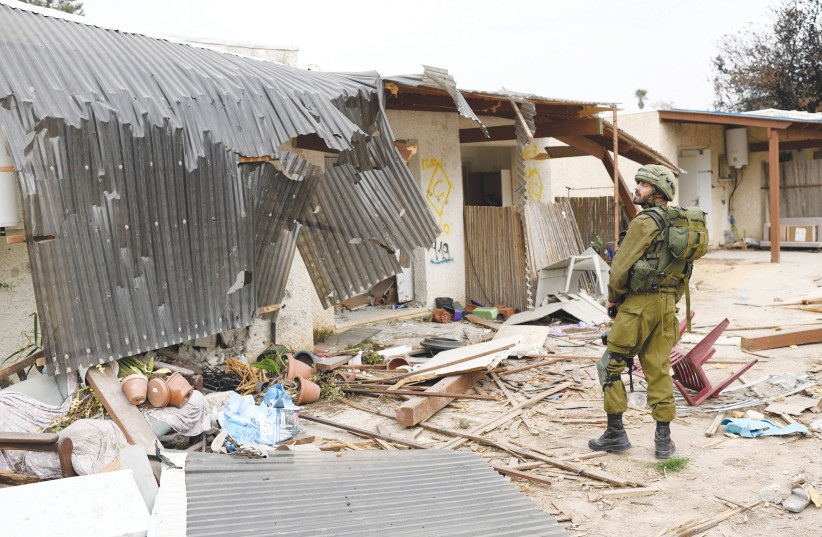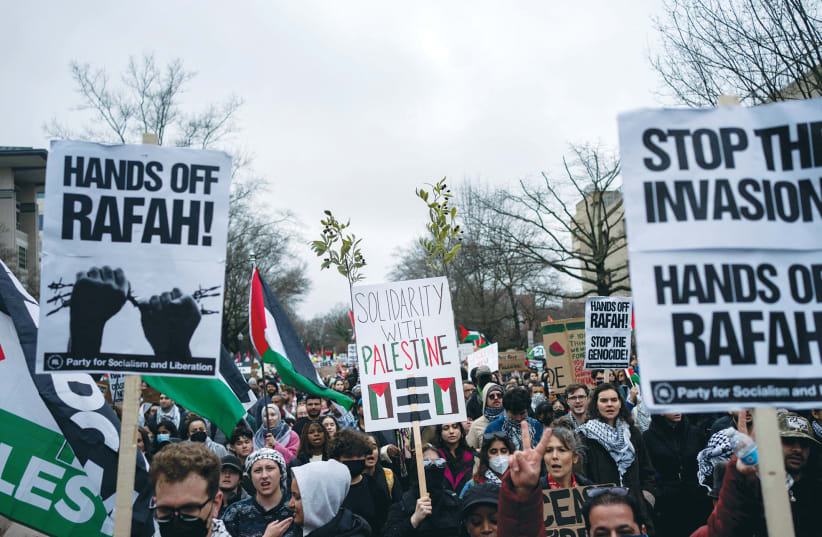The war in Gaza between Israel and Hamas, fought in the aftermath of the Simchat Torah massacre of October 7, has revealed fundamental differences between the Zionist movement, which is the underlying foundation of the State of Israel, and the Palestinian movement for an independent and free Palestinian State.
While the Jewish State of Israel is governed by a democratic parliament with elected leaders, the Palestinian “freedom movement” is a complicated system with competing organizations advocating different policies and acting inconsistently.
The Palestinian freedom movement and the Zionists both have advocates and apologists who live far from the land of Israel. The leaders of these diaspora movements write columns, give speeches, and appear on mainstream media platforms to explain the merits of their cause. The activists within these movements care deeply about their loyalty to the Israeli or Palestinian people and regularly demonstrate, rally, and lobby on behalf of their cause. They create slogans, talking points, and position papers that reflect the values and goals of their respective movements.
As the war continues and its pressure and stress develop, the values and goals of each movement become more apparent. Inconsistencies and hypocrisy that were not clear for decades are now showing themselves in the words and signs of the advocates on each side. Surprisingly, and in contrast to other political movements and parties, world opinion shifts in relation to the flaws in each side’s arguments. A recent Harvard-Harris poll showed American 18–—to 29-year-old opinions shifted from empathy for Palestinian positions to maintaining pro-Israel positions.
PALESTINIAN ADVOCATES around the world have been calling for investigations into the Israeli killing of Palestinian civilians in Gaza during the war. South Africa went so far as to call Israel’s killing of Palestinians a “genocide” and take Israel to the International Criminal Court (ICC). Many people around the world sympathized with the demonization of Israel’s battle policies.


The hypocrisy of the accusations against Israel was obvious when the mass killings of thousands of Palestinians by Syrian President Bashar Al-Assad during Syria’s civil war or Palestinians killed by Hezbollah, or even Hamas itself, didn’t sufficiently bother these same nations and advocates to bring them to demonstrate against any other killers of Palestinians.
When Palestinian advocates only demonstrate against Israeli killings of Palestinians but stay silent in the face of other killings, it speaks to a bias against Israel more than a care for Palestinians.
A ceasefire without the release of hostages is also hypocrisy
The calls for an unconditional ceasefire in the war also speak to blatant hypocrisy by Palestinian activists. These calls are one-sided and demand that Israel stop attacking Hamas fighters in Gaza but don’t mandate that Hamas stop fighting against Israel. The advocates for a one-sided ceasefire rarely mention the Palestinian terror attacks of October 7, sometimes going so far as to claim they are exaggerated – or didn’t even happen. They don’t acknowledge that Palestinian terrorists have been fighting IDF soldiers in Gaza since October 7, and this war has two sides to it. The hypocrisy of only demanding the Jewish army stop firing is unacceptable.
The goal of any civilized and responsible political movement should be peace between opposing factions. From talking points to chants to signs held high at rallies, Palestinian activists rarely call for peace with Israel. For a movement that claims so many ill effects of the Israeli-Palestinian conflict, it’s disappointing that it hasn’t made peace a priority. A peaceful ending to the Israeli-Palestinian conflict would undoubtedly improve Palestinian quality of life and condition.
In contrast to the Palestinian hypocritical calls and demands, Zionists have shown a consistent value-led approach to the war. Zionism is a political movement, but it is based on traditional Jewish values and the contemporary global focus on individual human rights for all people. Zionism and the Zionist state of Israel are so committed to its values that there have been countless times that Israels have preferred to put themselves at personal risk than advance and gain. This commitment to values has manifested itself consistently throughout the war in Gaza.
ALTHOUGH THERE have been plenty of examples of Israel’s enemies slandering Israel with false accusations of human rights violations, Israel’s record has shown it to be exceptional at providing all those under its control with the human rights every human being deserves.
Israel went over and above its international requirements by providing Israeli citizenship to the Arabs within its borders and granting them not only human rights but equal rights with every other Israeli citizen.
The Palestinians under Israel’s control, whether in Gaza before Israel withdrew or in Judea and Samaria today, are not Israeli citizens (they don’t live in Israel), but they are granted every human right they deserve. Israel’s just treatment of Palestinians is in direct contradiction to other Arab countries' treatment of Palestinians outlined above.
Israelis haven’t sounded calls for the killing of Palestinians throughout this war.
While Israel’s enemies have tried to twist its leaders’ words around to make them sound as nefarious and genocidal as possible – for example, describing Israeli Prime Minister Benjamin Netanyahu’s characterizing Hamas as “Amalek” as a call for the annihilation of the Palestinian people – Israelis have no interest in the killing of Palestinians.
From the very founding of the state, and even before its founding, Zionists have never expressed a desire or strategy of wiping out the Palestinian people. This is in direct contrast to Hamas’s call since its founding for the destruction of Israel and all Zionists.
Israel is concerned with its security, not with destroying another people.
The state has designated politicians who advocated for population transfers as terrorists, and it would demonstrate zero tolerance for calls for genocide. Israel has always followed Jewish and Zionist values to chase peace. It isn’t enough to merely await peace; Judaism and Zionism demand that peace be chased.
Modern-day Israel and its people have always stayed true to that vision. They have enthusiastically signed peace and normalization deals with six Arab countries and are eager to sign more as soon as possible.
Zionist and Palestinian values have shown themselves during this war; Israelis and Zionists should be proud of their country’s achievements.
The writer is a Zionist educator at institutions around the world and recently published a new book, Zionism Today.
